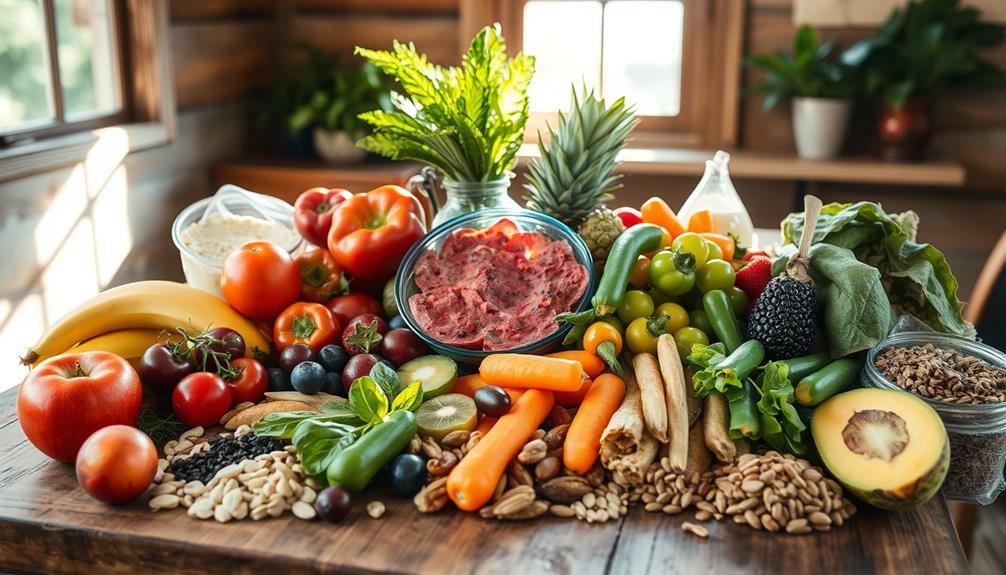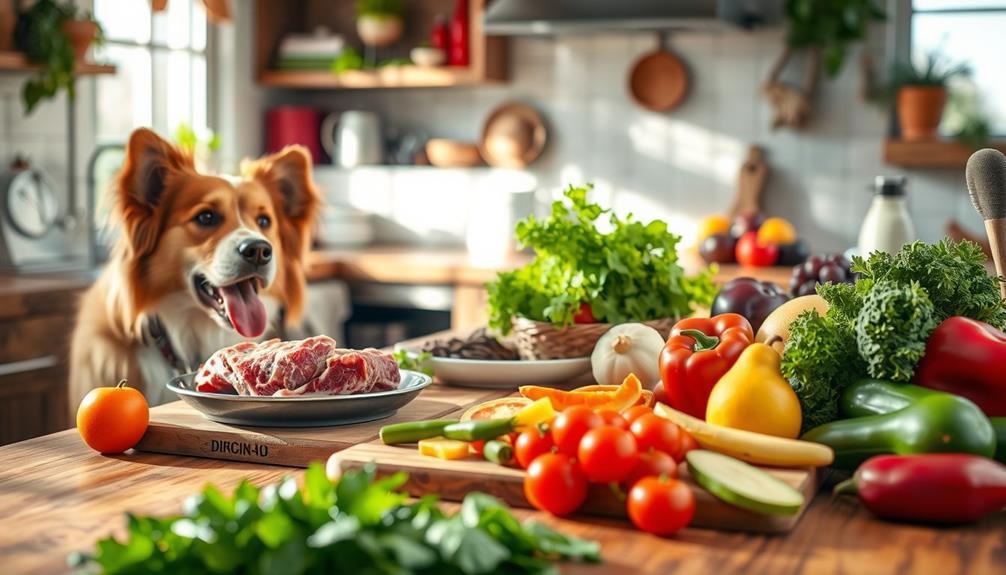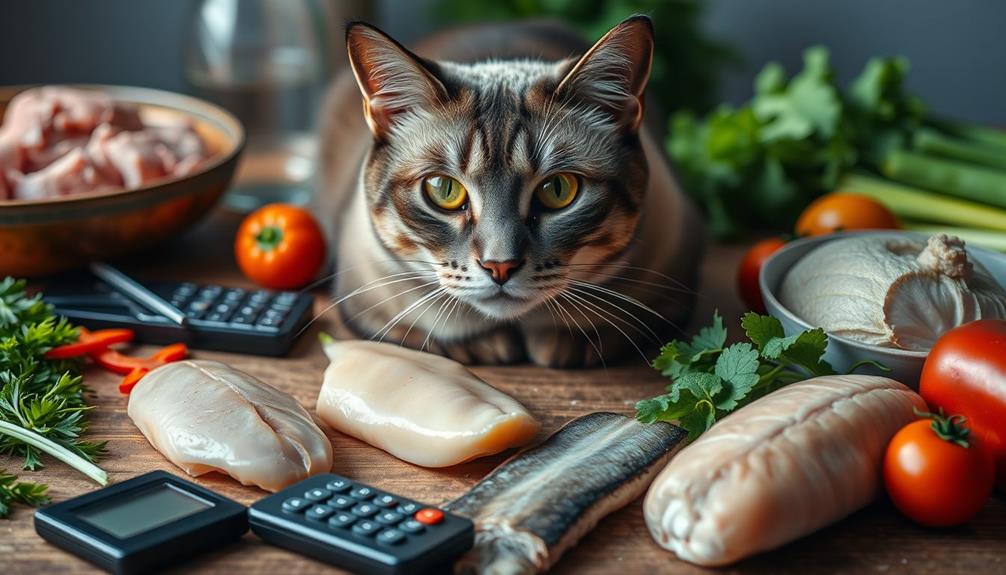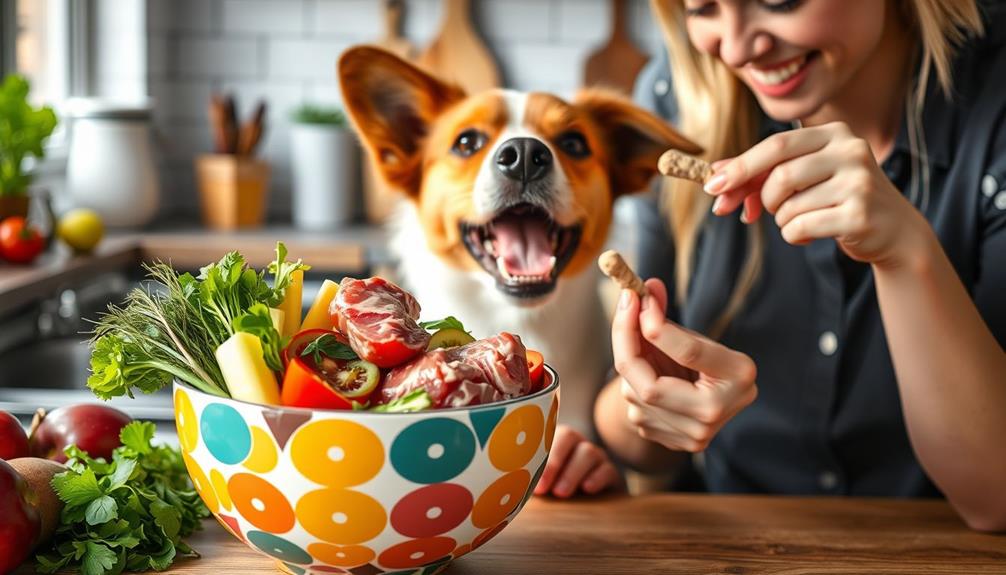Raw food diets for puppies can be beneficial, supporting gut health and providing essential nutrients for growth. They often reduce allergies and enhance dental health, making them appealing for many dog owners. However, you need to be cautious about potential risks, such as nutritional imbalances and bacterial exposure. Puppies require a balanced diet rich in calcium and phosphorus, so consulting a vet is vital. While there are challenges with sourcing and preparing raw food, understanding the best approach can make a difference. Explore more to find out how to navigate the complexities of raw feeding for your puppy. Feeding puppies raw food also requires careful handling and storage to prevent contamination. It’s important to follow safe food handling practices and to ensure that the raw meat is from a reliable source. Additionally, monitoring your puppy’s health and growth while on a raw food diet is crucial to ensure they are receiving the proper nutrients for their development. Overall, feeding puppies raw food can be a beneficial choice, but it’s essential to educate yourself and seek professional guidance to do so safely and effectively.
Key Takeaways
- Raw food diets can offer nutrient-rich benefits for puppies, enhancing gut health, energy levels, and reducing allergies.
- Nutritional imbalances and risks of harmful bacteria are significant concerns with raw feeding, necessitating careful formulation and veterinary consultation.
- Properly managed raw diets may support dental health through chewing raw meaty bones, countering common misconceptions about dental harm.
- Cost and time commitments for sourcing fresh ingredients and meal preparation can be challenging for busy pet owners.
- Gradual transitions to raw diets, along with safe food handling practices, are essential to minimize digestive issues and health risks.
Understanding Raw Food Diets
When you consider feeding your puppy a raw food diet, it's important to understand its core components and benefits. Raw food diets typically consist of raw meat, bones, fruits, and vegetables, designed to mimic what canines would eat in the wild.
This approach supports your puppy's gut health and immune system, especially when introduced after weaning, around 5-6 weeks of age. Proper hamster care and costs can provide insights into maintaining balanced nutrition for pets, emphasizing the significance of quality ingredients.
However, it's vital to guarantee that these raw food diets are properly balanced. An unbalanced diet can lead to nutritional deficiencies, which can cause serious health issues in your growing puppy. That's why sourcing high-quality ingredients and maintaining the right proportions of meat, bones, and plant matter is essential.
The BARF diet, which stands for Bones and Raw Food or Biologically Appropriate Raw Food, was popularized by veterinarian Ian Billinghurst in 1993.
This diet aims to provide a natural, species-appropriate way of feeding your puppy. By understanding the importance of a properly balanced raw food diet, you can help your puppy thrive and develop healthily, assuring they get the necessary nutrients for their growth.
Potential Benefits for Puppies
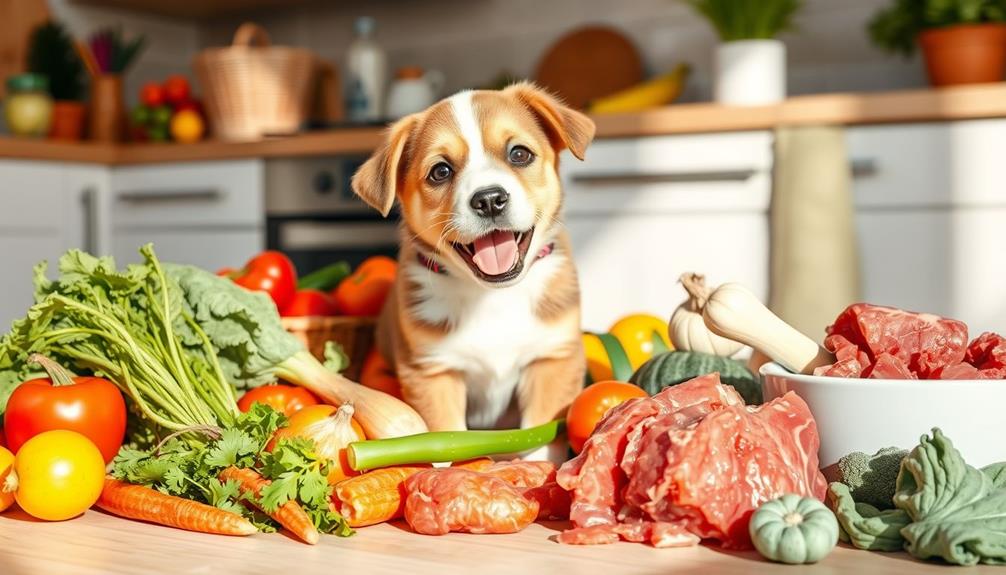
Feeding your puppy a raw food diet offers numerous potential benefits that can greatly impact their growth and overall well-being. By introducing essential nutrients, such as proteins, vitamins, and minerals, you support their ideal development during these critical early life stages.
Moreover, early exposure to raw diets may promote healthy gut flora, enhancing digestive health and immune function. This can lead to better health and wellness outcomes for your puppy.
Here's a quick overview of some potential benefits of raw diets for puppies:
| Benefit | Description | Impact on Puppy |
|---|---|---|
| Nutrient-Rich | Provides essential proteins, vitamins, and minerals | Supports growth and development |
| Digestive Health | Promotes healthy gut flora | Improves digestion and immunity |
| Reduced Allergies | Fewer processed ingredients, more control | Lowers risk of food sensitivities |
| Dental Health | Chewing raw meaty bones strengthens teeth and jaws | Develops strong oral health |
| Increased Energy | High-quality nutrition enhances liveliness | Supports active play and socialization |
With these potential benefits, raw diets can contribute greatly to your puppy's overall health and wellness.
Health Risks and Concerns

While many pet owners are drawn to the idea of a raw food diet for their puppies, it's important to be aware of the potential health risks and concerns associated with this approach. An unbalanced diet can lead to serious nutritional deficiencies, particularly during your puppy's significant growth phases.
For instance, improper calcium-phosphorus ratios may result in bone deformities, causing severe skeletal issues down the line. Additionally, puppies with a genetic predisposition to certain health issues might be more vulnerable to complications arising from a raw food diet.
Moreover, the high protein content found in raw diets mightn't be suitable for puppies with underlying kidney or liver problems, potentially exacerbating existing health issues. Puppies also have immature digestive systems, which may struggle to handle raw food as effectively as adult dogs. This can lead to gastrointestinal upset if you abruptly change their diet.
Furthermore, certain raw foods can pose considerable health risks. Items like chocolate or grapes are toxic to puppies, so careful dietary selection is important.
Ultimately, while a raw food diet can be appealing, it's necessary to evaluate these potential health problems to guarantee your puppy thrives. To ensure that your puppy is receiving all the necessary nutrients, it’s essential to consult with a veterinarian when considering a raw food diet. They can provide guidance on proper portion sizes, food safety, and any necessary supplements. Additionally, researching puppy feeding tips from reputable sources can also provide valuable insight into how to properly nourish your furry friend.
Cost and Preparation Challenges
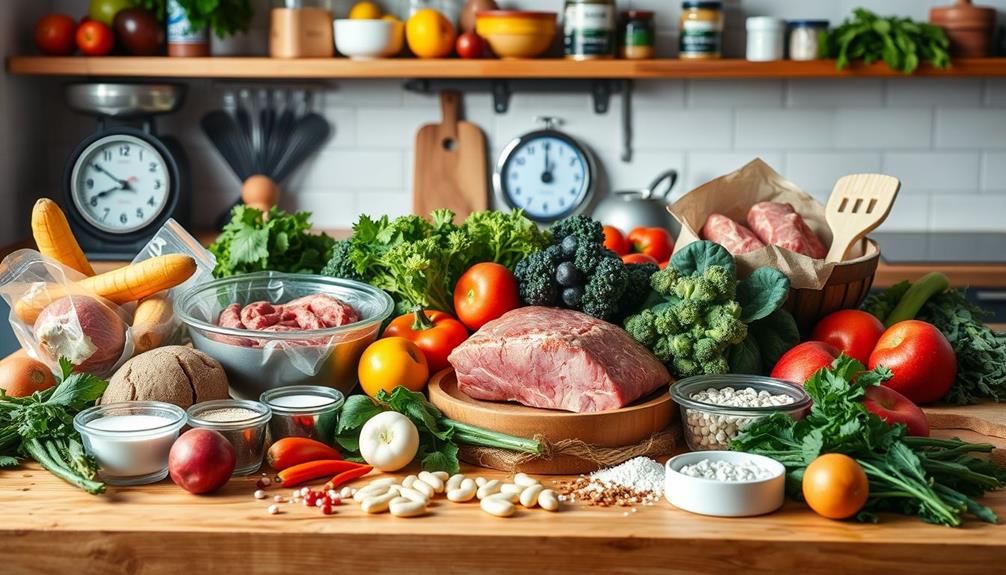
Feeding your puppy a raw diet can be quite expensive, with high-quality ingredients often making up the bulk of your costs.
Additionally, understanding your budget is essential, as you may need to set specific targets for your pet food expenses.
You'll also find that meal prep is time-consuming, requiring several hours every couple of weeks to get everything ready.
Plus, sourcing specific ingredients can lead you on a scavenger hunt through multiple stores, adding to the challenge.
Expense of Raw Ingredients
Raw diets for puppies can quickly become a financial commitment, with high-quality meat making up about 70% of their meals. Unlike standard kibble, the expense of raw ingredients can escalate rapidly, sometimes costing two to three times more annually. Your choice of protein source dramatically influences costs, and sourcing specific nutrients can add additional expenses.
Here's a breakdown of potential costs associated with a raw diet for your puppy:
| Ingredient Type | Estimated Cost per Month |
|---|---|
| High-Quality Meat | $100 – $300 |
| Organ Meats | $30 – $80 |
| Bones | $20 – $60 |
| Supplements | $15 – $50 |
| Vegetables & Grains | $10 – $30 |
In addition to these costs, you'll also face challenges in finding crucial ingredients. You may need to visit multiple stores to locate organ meats and bones, which can be cumbersome. Overall, while a raw diet may offer health benefits, it's important to evaluate the significant financial commitment and confirm you're prepared for the ongoing costs.
Time-Consuming Meal Prep
Many pet owners find that preparing raw meals for their puppies can be a time-consuming endeavor. You'll likely spend about 4-5 hours every two weeks on meal prep, which involves sourcing, washing, chopping, and portioning ingredients.
Balancing nutrition is vital, but it adds to the complexity of raw diets. Additionally, understanding the importance of selecting the right cold medication can parallel the careful selection of ingredients for your puppy's meals.
Planning is important, as you may need to visit multiple stores to find specific ingredients like organs and bones. This can become overwhelming, especially if you have a busy schedule.
Furthermore, maintaining the freshness of prepped meals requires special storage solutions, such as deep freezers, further complicating the process.
For many families, the significant time commitment of raw meal prep may not fit into their lifestyles. The convenience of kibble often outweighs the benefits of raw feeding for those juggling work, family, and other responsibilities.
If you're considering a raw diet for your puppy, be prepared for the time-consuming nature of the meal prep involved. It's important to weigh the benefits against the effort required to make sure your puppy gets the best nutrition without sacrificing your valuable time.
Ingredient Sourcing Difficulties
Sourcing high-quality ingredients for your puppy's raw diet can be an intimidating task. You'll often find that local grocery stores don't stock the fresh meats, organs, and bones that are crucial for a balanced puppy diet. This ingredient sourcing difficulty can lead you to specialty shops or reliable suppliers, which may not be conveniently located.
Additionally, it's important to be aware of the nutritional quality of the ingredients you choose, as improper selection could affect your puppy's health. For instance, air quality considerations can impact the freshness of ingredients and overall health of your pet.
The cost of high-quality raw ingredients can also add up quickly. With meat making up about 70% of your puppy's diet, you'll likely spend considerably more on raw food compared to kibble. This financial aspect can be overwhelming, especially if you're on a budget.
Additionally, meal preparation for a raw diet isn't just about gathering ingredients; it requires considerable time and effort. You might need to dedicate 4-5 hours bi-weekly just for shopping, chopping, and assembling to guarantee your puppy receives the right nutritional balance.
Puppies have specific nutritional needs, so consulting with a veterinarian or canine nutritionist is essential for proper ingredient selection. Limited availability of certain nutrient-dense organs can complicate this process further, necessitating multiple store visits.
Myths Surrounding Raw Feeding
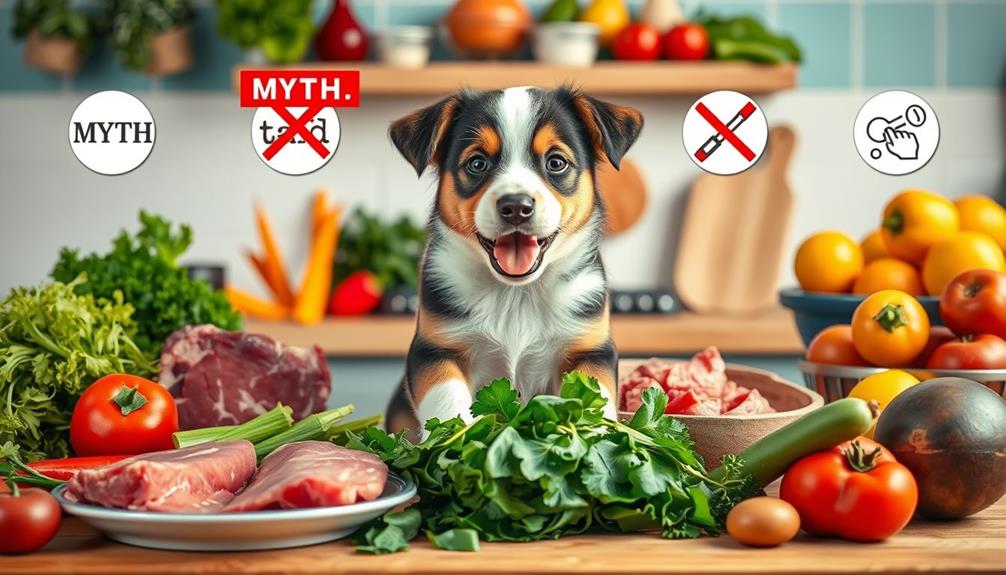
You might think kibble is the only safe choice for your puppy, but many myths surround raw feeding that need clarification.
It's easy to assume raw diets are nutritionally unbalanced or lead to health issues, yet when done right, they can provide essential nutrients and even boost dental health.
For instance, incorporating natural ingredients can promote overall health and wellness in your growing pup.
Let's explore these misconceptions and see how raw feeding can be a viable option for your growing pup.
Kibble Vs. Raw Misconceptions
When it comes to the debate between kibble and raw diets for puppies, misconceptions abound that can confuse pet owners. Let's clear up some common myths surrounding raw feeding for dogs.
| Misconception | Truth | Impact on Pet Health |
|---|---|---|
| Raw diets are unsafe due to bacteria | Kibble often has more pathogens; dogs handle bacteria well | Misguided fear of raw diets |
| Raw diets are nutritionally unbalanced | Balanced raw diets exist with proper formulation | Nutritional confusion |
| Raw feeding causes dental issues | Raw meaty bones promote dental health; kibble doesn't clean teeth well | Dental health overlooked |
| Raw feeding is always expensive | Costs can be comparable to high-quality kibble | Financial concerns unfounded |
| Raw feeding is just a fad | There's growing research supporting raw diets | Dismissal of health benefits |
Nutritional Balance Concerns
While debunking misconceptions about kibble versus raw diets, it's important to address the nutritional balance concerns that often arise with raw feeding. Many people believe that raw diets are inherently unbalanced, but that's not entirely true. You can achieve balanced raw diets by carefully formulating them or using commercially prepared products that meet nutritional standards.
Additionally, just as with human diets, the inclusion of various food types can enhance the overall nutrient profile, making it more beneficial for your puppy's health nutritional benefits include high fiber and vitamin content.
However, it's essential to be aware that nutritional deficiencies can occur if raw diets aren't properly balanced. Homemade formulations might lack essential nutrients like calcium and phosphorus unless you supplement them correctly.
It's also important to rotate protein sources in your puppy's raw diet. Relying on a single protein can lead to imbalances over time, which could affect your puppy's growth.
Puppies have specific nutrient requirements for healthy development, making it necessary to consult with a veterinarian during the shift to raw feeding. Research supports the potential benefits of raw diets, but it consistently emphasizes the importance of nutritional balance to prevent severe health issues linked to deficiencies.
Vet Recommendations and Insights
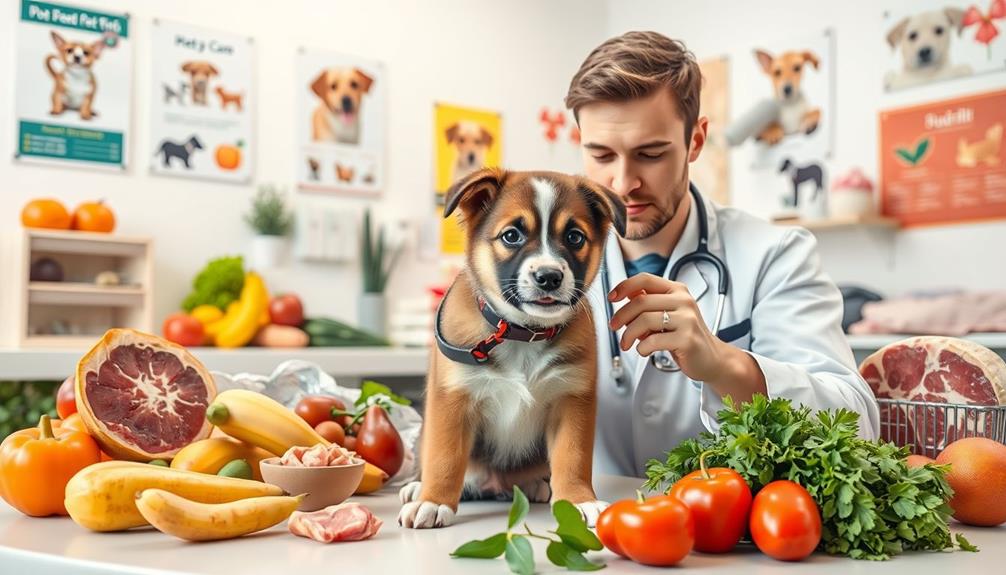
Veterinarians often express concerns about raw diets for puppies, highlighting the risks associated with nutritional imbalances and developmental issues. Puppies require a specific balance of nutrients, especially calcium and phosphorus, which can be tricky to achieve with homemade raw diets. Without proper guidance, you might inadvertently create deficiencies that could hinder your puppy's growth and health.
Additionally, it's important to take into account the significance of financial considerations for elderly care when planning for your pet's long-term health and needs.
Moreover, raw diets can increase the risk of exposure to harmful bacteria like Salmonella or E. coli, posing serious health risks not just to your puppy but also to your household members.
Veterinary associations strongly recommend consulting with a veterinarian or a pet nutritionist before making any dietary changes. They can help guarantee that your puppy's nutritional needs are met while minimizing risks.
Additionally, regular veterinary check-ups are vital if you're contemplating a raw diet. These visits allow for monitoring of your puppy's growth, health, and any potential deficiencies that may arise from their diet.
Making an Informed Decision

As you consider a raw diet for your puppy, it is essential to weigh the potential benefits against the risks. A well-planned raw diet can support gut health and boost your puppy's immune system. However, it's imperative to guarantee that the diet is nutritionally balanced to meet their specific growth needs. Here's a quick overview to help you make an informed decision:
| Benefits | Risks | Recommendations |
|---|---|---|
| Supports gut health | Possible gastrointestinal upset | Gradual change to raw diets |
| Boosts immune system | Nutritional deficiencies | Consult a veterinarian |
| Encourages natural eating habits | Risk of bacterial contamination | Source high-quality ingredients |
To avoid deficiencies, consult with a veterinarian or pet nutritionist when formulating your puppy's raw diet, making sure it includes essential nutrients like calcium and phosphorus. Remember, the safety of feeding raw meat can be enhanced by practicing safe food handling. By taking these precautions, you can help your puppy thrive on a raw diet while minimizing potential health risks.
Frequently Asked Questions
Is Raw Food Recommended for Puppies?
You might consider raw food for puppies, but it's essential to guarantee it's balanced and monitored. Consulting a vet can help you avoid nutritional deficiencies and guarantee your puppy thrives on this diet.
Do Vets Recommend Raw Food for Puppies?
Envision this: you're at a diner, pondering puppy nutrition. Most vets don't recommend raw food for puppies due to potential health risks and nutritional imbalances. Always consult a vet for tailored advice on your pup's diet.
Why Do Vets Disagree With Raw Feeding?
Vets disagree with raw feeding because it can cause nutritional imbalances, gastrointestinal issues, and health risks from bacterial contamination. They emphasize the importance of balanced diets and regular check-ups to guarantee your puppy's well-being.
Is Raw Meat Healthy for Puppies?
Raw meat can be healthy for puppies if it's properly balanced and sourced from high-quality suppliers. You'll need to guarantee they get enough calcium and phosphorus for strong bone development, so consulting a vet's essential.
Conclusion
As you weigh the pros and cons of a raw food diet for your puppy, remember the age-old adage, "You are what you eat." Just like a well-tended garden flourishes, so too can your pup thrive with the right nutrition. However, be mindful of the hidden risks that lurk like weeds in the soil. Ultimately, staying informed and consulting with your vet will guide you toward a nourishing path for your furry friend's health and happiness.


